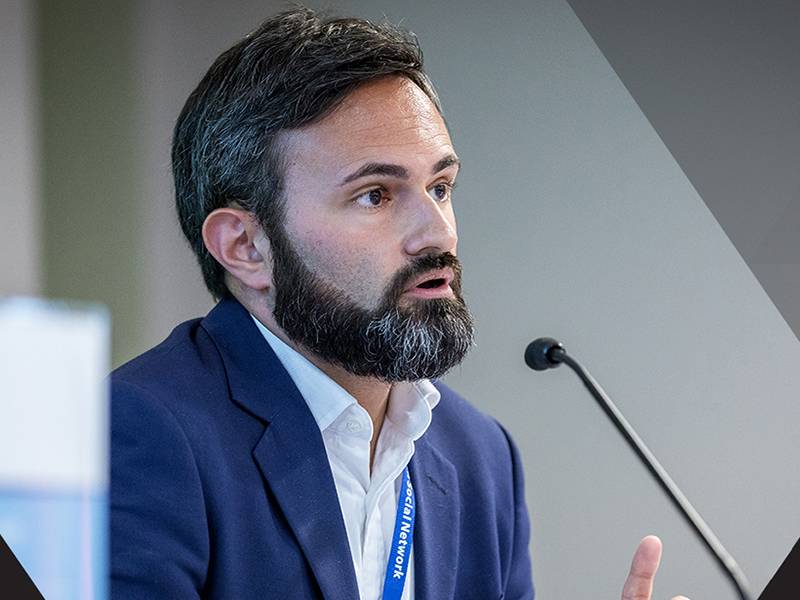European Social Network: “Physical meetings and members' contact are non-replaceable”

The European Social Network (ESN) is a growing community of more than 150 public authorities and organisations responsible for social services across Europe, and beyond. At the crest of this global tsunami, social services will be one of the first lifesavers for the multiple crises in social care, unemployment and public housing. We spoke with Alfonso Lara Montero (cover photo), CEO of ESN about these sensitive topics and the pulse of his association in this dark year.
1) At the pandemic's one-year mark, how did ESN respond to the related constraints and challenges?
COVID-19 has brought about incredible disruption for everyone, but it has also led us to implement digital, agile and remote ways of working. Despite the series difficulties we faced, ESN created and adapted extensive opportunities of mutual learning for our members and partners. We shifted to remote working to protect employees, and 100% online knowledge exchange and knowledge-building activities to serve members facing mobility restrictions almost overnight.
We mobilised global expertise instantly, organised meetings ranging from 30 to 300 people almost immediately, and responded to members’ inquiries more rapidly by providing everything digitally, from preparation to follow up. We were sad not to be able to run our annual conference onsite for the first time in 28 years. Nevertheless, we made a significant investment to ensure that our digital channels were up to speed to pivot to our first full virtual programme of workshops, working group meetings, annual seminar and the European Social Services Awards ceremony.
2) How are you looking to create value propositions and cooperation between your membership, while meetings and travels are not allowed?
When the lockdown started across Europe and non-essential travel was restricted, we were faced with the challenge of continuing our activities through digital platforms. Interactive online meetings became the new normal for ESN members. When organising online meetings, we focused our work on our members' experience and knowledge. By including them in the preparatory process and involving them as presenters and speakers, we have been able to keep their interest high.
We have managed to maintain a close relationship with our members by actively reaching out to them. For instance, we launched a dedicated webpage that gathered resources and best practice on how social services, across Europe, responded to the emergency created by COVID-19. We also led a series of webinars on relevant themes for them such as ensuring continuity of care, child support, impact on long-term care or crisis preparedness, as well as publications focused on these themes, such as the challenges, needs and impact of COVID- 19 on social services crisis planning.

3) The pandemic will wreak havoc on the social fabric of our communities, leaving a deep crisis in education, employment and housing. Is ESN focused on promoting new and revamped public social services?
We are aware of the heavy toll that COVID-19 has had on public social services and social care across Europe. Initial data from members indicate that as inequalities increase, so does the number of requests for social services support and their cost. Strong public social services not only act as an effective safety net to protect the most vulnerable, but they are also vital for economic recovery through the promotion of an inclusive society.
ESN has documented the strategic role of social services in the future recovery of Europe through the recovery and resilience facility and the next funds programming period. We have identified examples of investments that are necessary for the transformation of public social services that respond to the needs of people and communities across Europe. We are working with our members to help them formulate proposals for a new model of community and family-home care for children with families, people with disabilities and older people with complex needs to respond to the current social emergency and to build more resilient social welfare systems.
4) How important will it be to encourage coordinated responses between EU member states? What role will social policies and knowledge exchange play in the decision-making of recovery programmes?
Coordinated efforts are crucial to ensure a successful response to the pandemic. As we saw at the beginning, when countries do not work together there is a risk of lack of solidarity. The approval of European financial instruments has been critical to cushion the most immediate social impact. Additional cohesion funds through the REACT-EU can help to mitigate some of the significant inequalities that have appeared over the last months, while the resilience facility could help to contribute to reforms in the sector.
Knowledge exchange and building is a very strong tool to inform national and European policies so that policy priorities respond to the concerns and needs of the directors, practitioners and people using social services. The work that ESN does at European level to document the concerns and needs of public social services is decisive to ensure that European guidelines are well informed. At national level, we are working with our members so that they promote innovative and transformative models of care that can help meet their needs while promoting a more resilient society.
5) Beyond the massive rewards that tech innovation has brought to the heart of associations, isn't it also shrinking their multipurpose essence?
The increased possibilities to use technology to achieve our network’s objectives provides a unique opportunity to gather people from all corners of the world. They helped us stay close to the evolving needs of our members during the pandemic.
Physical meetings and contact with our members are non-replaceable. However, today’s technology provides us with options that we can use to expand our network and develop relationships with organisations across the world.
6) With tech innovation, new sustainable practices and social protest movements underway, what will ESN's new working frame and fundamentals be to catch up with a new world?
ESN has been the leading network for social services for almost 30 years. The first project led by ESN in 1999 was on personal budgets which is now promoted at EU level as an innovative tool. We have been at the forefront of planning and managing social services through the European Social Services Conference, a series of projects, our framework agreement with the European Commission and more recently the European Social Services Awards.
Public social services are the cornerstone of social welfare systems and policies. While they need to adapt to respond to evolving needs and be more resilient to crises, they will always be both a safety net and an economic investment. We will continue to promote strong public social services highlighting new and innovative models, using digital means and promoting partnerships across sectors. I believe that this approach will be more relevant than ever after the pandemic.
Other Articles
About Us
Supported by the Union of International Associations (UIA), the International Association of Professional Congress Organisers (IAPCO) and the Interel Group, the global public affairs and association management consultancy, Headquarters Magazines serve the needs of international associations organising worldwide congresses.














